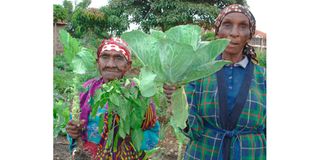Living on hope – the life and times of a rural granny

Living on hope - elderly farmers happy with their produce. They are a reflection of the reality of the everyday life of Kenya’s woman living in the rural areas.
What you need to know:
- Defying the freezing cold of Nyandarua - at the foot of the Aberdare Ranges- Elisheba Wanjiku cannot remember the last time she got out of bed after 5.30am.
- Three times a year, she religiously grows potatoes on a huge section of the land, for ‘commercial’ purposes, but making massive losses almost all the time.
Defying the freezing cold of Nyandarua - at the foot of the Aberdare Ranges- Elisheba Wanjiku cannot remember the last time she got out of bed after 5.30am.
Shy of 80 years today, she maintains the trend, never mind the old age and the debilitating arthritis and other age-related ailments that threaten to weaken and sap the little energy left in the great grandmother.
The mother of nine worries that in addition to effects of climate change, these susceptibilities will collude to incapacitate and keep her off the beloved shamba and farming activities.
The vulnerabilities notwithstanding, the elderly woman works on her 20-acre farm for the better part of six days of the week, taking a break only on Sundays, to go to church, or listen to her favourite preacher on her small TV. .
Three times a year, she religiously grows potatoes on a huge section of the land, for ‘commercial’ purposes, but making massive losses almost all the time.
But no amount of persuasion including from family, deters the widow from this passion, nay addiction, of toiling year in year out, only for the produce to be literally stolen.
Nosy brokers
During harvesting, nosy brokers descend on her home to purchase straight from the farm.
They mercilessly package 50kg (used to be 90!) bags, ‘innovating’ to take almost double its size, and pay for a song.
Elisheba’s sale was on the first week of October when the brokers made away with 12-bags for Sh400 each! This has left her devastated. Although she has known all along that she was exploited, this was the lowest it has ever gone.
“We ignore the losses and keep working, hoping for a better price and good deal next time, but it does not happen. Things are going from bad to worse,’’ she calmly says. “We live on hope,’’ she adds.
The granny has now resolved to concentrate on subsistence farming, a resolution her family has heard all so often.
At the height of the Covid-19 lock-down - after the dreaded pandemic hit Kenya in March 2020, Elisheba and other parents (mostly mothers) from different parts of the country, kept their families in urban areas, especially Nairobi, going.
They would send their loved ones constant food supplies such as potatoes, peas, vegetables, and maize via matatus and courier services- during those difficult times.
Elisheba’s is a reflection of the reality of the everyday life of Kenya’s woman living in the rural areas.
Own land
But, these resilient women do not have to toil and slave on own land as they face all manner of exploitation and mistreatment.
National and county governments are obliged to safeguard this gender and their rights - protect them from exploitation and manipulation, cushion them against vagaries of weather and ensure they have access to resources, skills and better markets for their produce.
The need for women’s economic empowerment cannot be gainsaid, and the women in rural areas - who also make up more 50 per cent of the agriculture sector labour force, have proved they are willing and ready to work for themselves, their families and the country to ensure food security - but the conditions have to be conducive for this - the climate crunch and horrendous Covid-19 pandemic notwithstanding.
On this International Day of Rural Women, it is in order to recognise efforts made by organisations and some county governments, in empowering and building general resilience among the rural woman for a better life.
There are amazing stories of success and transformation of women in the rural areas from innovation to digital farming that have seen individuals and groups ditch brokers and other agents of exploitation - a step that has changed their lives for the better.
Illiterate woman
I have encountered such awesome stories from barely illiterate women who can now farm through the digital platform, sell their produce on the same and feed the nation.
These examples are galore within Groots-Kenya, an organisation (more of a movement of women led community-based groups, CBOS) that works with communities and grassroots women in Kenya’s 17 counties.
Ms Rugene is founder, The Woman’s Newsroom Foundation and consulting Editor. [email protected]





